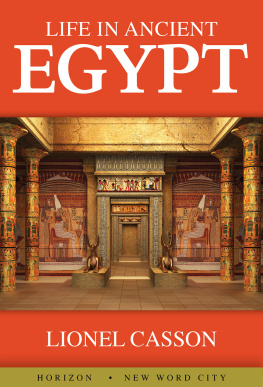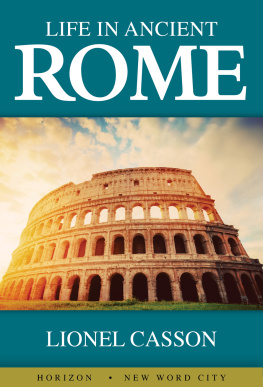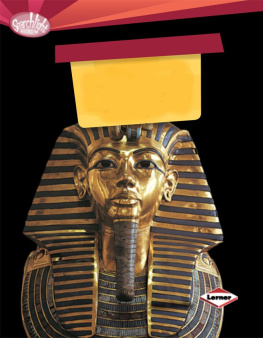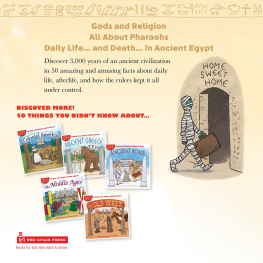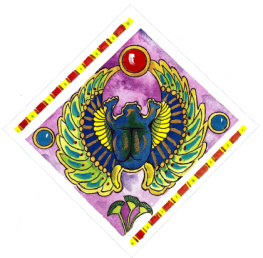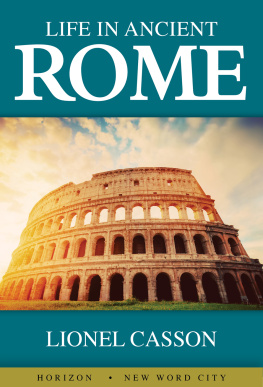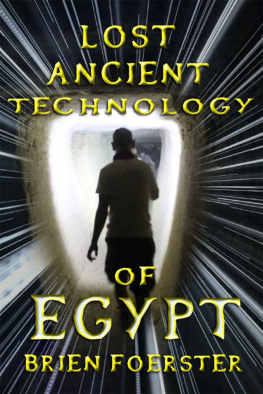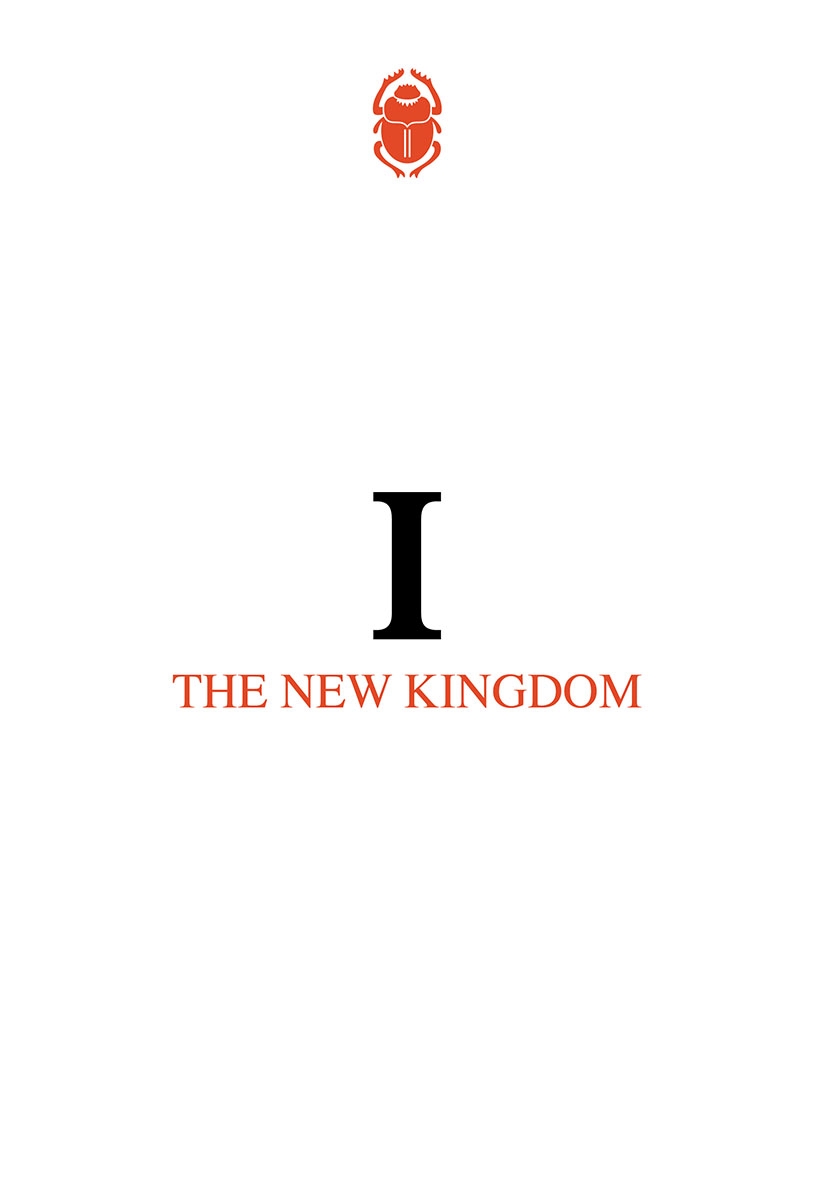This book presents concise sketches of key aspects of Egypts people and their ways during the New Kingdom, roughly 1550 to 107 B.C. This was a time of extended peace and great prosperity whose remains, in particular, the many tombs of pharaohs and nobles tunneled into the living rock and lavishly decorated with wall paintings, illumine vividly the daily life of the low as well as the high . The sketches treat: the structure of Egyptian society; the nature of family life; the place of women in the family and society; farming and what enabled it to be the basic source of the countrys wealth; religion, the role of the afterlife, which demanded so much of an Egyptians time and resources, and the extraordinary effort of one heretical pharaoh to introduce radical religious change; the professions, whose members included engineers capable of raising such structures as the pyramids and the mighty temples at Luxor and Karnak, and doctors so famed that they were in demand abroad; and the crafts, whose practitioners turned out works that today are treasured objects in museums all over the world.
They had a king who to them was a living god on earth, not merely heavens chosen. They worshiped deities endowed with human bodies and animal heads or incarnated in crocodiles, bulls, cats, and other creatures, and they continued to do so long after they had become a sophisticated people. They were so hidebound that they maintained the same political forms, the same social structure, even the same style of art, for nearly 3,000 years. No question about it, the Egyptians were a race apart.
One reason for this was the special geography of their land. The Valley of the Nile was in truth a cradle of civilization, a place which assured the society that arose there an infancy snug and secure, unaffected by what went on in the regions round about. On three sides, deserts formed a barrier, and on the fourth, the sea. Invaders who entertained the idea of breaking in by sailing down the Nile found six cataracts barring the way. The river, when properly handled, guaranteed the richest crops in the ancient world. In Upper Egypt, the sun shone all day all year, while Lower Egypt received hardly more than a touch of rain; the Egyptians were blessedly ignorant of the violent weather that caused their contemporaries in Mesopotamia to make the god of storm their chief deity, or the Greeks across the water to refer to theirs as the Cloud-Gatherer and the Thunderer. They conceived of the world as stable and benign, and it is easy to see why, in their isolation and security, they did so.
One thing was required of them, cooperation. Since there was no rain, all water had to come from the river. Every year it flooded on schedule and provided plenty - so long as people worked together to build the dikes, canals, catch basins, and other devices needed to conserve it and were reasonable about sharing it. The Egyptians obviously worked well together, for we find them at a precocious age in their development forming ever expanding social and political entities, and eventually creating the first nation in history. It came into being when, about 3000 B.C., a semi-legendary pharaoh named Menes took the final step of uniting Upper and Lower Egypt and thereby making the whole country into a single state; its capital he established at Memphis, not far from modern Cairo. From this moment on, Egyptian history marches along, dynasty after dynasty (it is traditional to divide its history into dynasties, periods when members of the same family ruled in succession), from the shadowy First Dynasty founded by Menes to the Thirtieth, the feeble kings of the mid-fourth century B.C. who held the throne during Egypts last days as an independent state.
Once the land had been unified, it took but a few centuries to bring Egypts culture into full flower. The Third to the Sixth dynasties, roughly 2675 to 2170 B.C., the period historians call the Old Kingdom, was an age in which its civilization was successful in a way that it would never be again, attaining heights it was never to reach again. The Egyptians enjoyed a style of life that was uniquely their own, totally free of influences from outside. They were able to hold serenely to their conviction that the gods had set the world along a fixed and stable course, that the pharaoh ruled the land so that it was in harmony with this course, and that he could not do wrong; if things went awry - and even in the sunlit tranquility of Old Kingdom Egypt they occasionally did - these were quite temporary interruptions that would soon be righted. Everyones place and purpose in life were clearly and simply defined: The pharaoh, a literal god on earth, owned all the land and disposed of the total energies of all his people. The high point of the Old Kingdom, and, in some ways, of Egypts 3,000-year career as a nation, was the Fourth Dynasty (about 2625-2500 B.C.), when pharaohs were able to call forth the labor, resources, and skills that produced the great pyramids to serve as their tombs.
Three centuries later, the impossible had happened. The order that was supposed to be built into the nature of things had somehow become disorder - the god on earth no longer even ruled his land; he had been deposed, and Egypt was reduced to a cluster of little states, each under its own princeling. This land is helter-skelter, wrote a so-called prophet in utter bewilderment, and no one knows the result... I show thee the land topsy-turvy. That which never happened has happened. Why, really, the land spins around as a potters wheel does, wrote another. Law and order broke down so completely that people dared to ransack and burgle the holy of holies, the graves of their erstwhile god-kings. One writer expresses the disillusionment that swept the land with a bitter cynicism and alienation :
To whom can I speak today?
Hearts are rapacious:
every man seizes his fellows goods.
(To whom can I speak today?)
The gentle man has perished,
(But) the violent man has access to everybody.
To whom can I speak today?
(Even) the calm of face is wicked;
goodness is rejected everywhere.
To whom can I speak today?
(Though) a man should arouse wrath by
his evil character,
He (only) stirs everyone to laughter, (so)
wicked is his sin....
To whom can I speak today?
Faces have disappeared:
every man has a downcast face toward his fellows.
Almost a century and a half passed before there was a return to the settled conditions that the Egyptians had once conceived to be eternally fixed. Some decades after 2100 B.C., the princelings of the little town of Thebes in Upper Egypt gathered the strength to conquer their competitors and reunite the kingdom. They transferred the capital to Thebes, which swiftly became a major city, and their dynasty, the Eleventh, launched the prosperous and successful period in Egyptian history known as the Middle Kingdom (1980-1630 B.C.). Powerful and able as the new rulers were, they could not turn back the clock. Egypt would never return to the serenity and confidence of Old Kingdom days. The difference is visible in the rendering of the pharaohs image: The Old Kingdom rulers in their portraits gaze upon the world majestic and unruffled; those of the Middle Kingdom have careworn faces.

